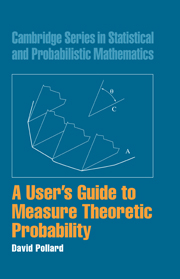Book contents
- Frontmatter
- Contents
- PREFACE
- CHAPTER 1 MOTIVATION
- CHAPTER 2 A MODICUM OF MEASURE THEORY
- CHAPTER 3 DENSITIES AND DERIVATIVES
- CHAPTER 4 PRODUCT SPACES AND INDEPENDENCE
- CHAPTER 5 CONDITIONING
- CHAPTER 6 MARTINGALE ET AL.
- CHAPTER 7 CONVERGENCE IN DISTRIBUTION
- CHAPTER 8 FOURIER TRANSFORMS
- CHAPTER 9 BROWNIAN MOTION
- CHAPTER 10 REPRESENTATIONS AND COUPLINGS
- CHAPTER 11 EXPONENTIAL TAILS AND THE LAW OF THE ITERATED LOGARITHM
- CHAPTER 12 MULTIVARIATE NORMAL DISTRIBUTIONS
- APPENDIX A MEASURES AND INTEGRALS
- APPENDIX B HILBERT SPACES
- APPENDIX C CONVEXITY
- APPENDIX D BINOMIAL AND NORMAL DISTRIBUTIONS
- APPENDIX E MARTINGALES IN CONTINUOUS TIME
- APPENDIX F DISINTEGRATION OF MEASURES
- INDEX
CHAPTER 1 - MOTIVATION
Published online by Cambridge University Press: 29 March 2011
- Frontmatter
- Contents
- PREFACE
- CHAPTER 1 MOTIVATION
- CHAPTER 2 A MODICUM OF MEASURE THEORY
- CHAPTER 3 DENSITIES AND DERIVATIVES
- CHAPTER 4 PRODUCT SPACES AND INDEPENDENCE
- CHAPTER 5 CONDITIONING
- CHAPTER 6 MARTINGALE ET AL.
- CHAPTER 7 CONVERGENCE IN DISTRIBUTION
- CHAPTER 8 FOURIER TRANSFORMS
- CHAPTER 9 BROWNIAN MOTION
- CHAPTER 10 REPRESENTATIONS AND COUPLINGS
- CHAPTER 11 EXPONENTIAL TAILS AND THE LAW OF THE ITERATED LOGARITHM
- CHAPTER 12 MULTIVARIATE NORMAL DISTRIBUTIONS
- APPENDIX A MEASURES AND INTEGRALS
- APPENDIX B HILBERT SPACES
- APPENDIX C CONVEXITY
- APPENDIX D BINOMIAL AND NORMAL DISTRIBUTIONS
- APPENDIX E MARTINGALES IN CONTINUOUS TIME
- APPENDIX F DISINTEGRATION OF MEASURES
- INDEX
Summary
SECTION 1 offers some reasons for why anyone who uses probability should know about the measure theoretic approach.
SECTION 2 describes some of the added complications, and some of the compensating benefits that come with the rigorous treatment of probabilities as measures.
SECTION 3 argues that there are advantages in approaching the study of probability theory via expectations, interpreted as linear functionals, as the basic concept.
SECTION 4 describes the de Finetti convention of identifying a set with its indicator function, and of using the same symbol for a probability measure and its corresponding expectation.
SECTION *5 presents a fair-price interpretation of probability, which emphasizes the linearity properties of expectations. The interpretation is sometimes a useful guide to intuition.
Why bother with measure theory?
Following the appearance of the little book by Kolmogorov (1933), which set forth a measure theoretic foundation for probability theory, it has been widely accepted that probabilities should be studied as special sorts of measures. (More or less true—see the Notes to the Chapter.) Anyone who wants to understand modern probability theory will have to learn something about measures and integrals, but it takes surprisingly little to get started.
For a rigorous treatment of probability, the measure theoretic approach is a vast improvement over the arguments usually presented in undergraduate courses. Let me remind you of some difficulties with the typical introduction to probability.
Independence
There are various elementary definitions of independence for random variables.
Information
- Type
- Chapter
- Information
- A User's Guide to Measure Theoretic Probability , pp. 1 - 16Publisher: Cambridge University PressPrint publication year: 2001
